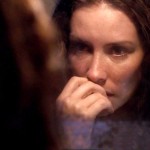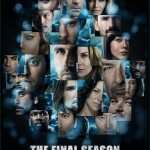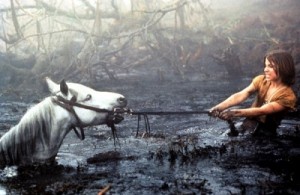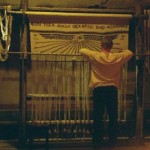 Have you ever met someone for the first time who seemed really familiar to you? Strangely, this person likely wound up being an important player in your life. This exact scenario happens to Jack in LA X when he recognizes Desmond on the plane. In What Kate Does, Kate’s parallel life is once again setting up the scene for her to have a connection with Claire and baby Aaron. What if the reason for this familiarity is because we are recognizing these people from our future, or from the story of our destiny?
Have you ever met someone for the first time who seemed really familiar to you? Strangely, this person likely wound up being an important player in your life. This exact scenario happens to Jack in LA X when he recognizes Desmond on the plane. In What Kate Does, Kate’s parallel life is once again setting up the scene for her to have a connection with Claire and baby Aaron. What if the reason for this familiarity is because we are recognizing these people from our future, or from the story of our destiny?
 As soon as I learned of the title of Lost’s Season 6 premiere episode last year, I immediately began to wonder about its implications. Sure, the LA X was a reference to LAX, the abbreviation for Los Angeles International Airport where Oceanic Flight 815 was suppose to land, but why was there a space between the “LA” and the “X”? Like everything on Lost, surely this play on letters was for a reason.
As soon as I learned of the title of Lost’s Season 6 premiere episode last year, I immediately began to wonder about its implications. Sure, the LA X was a reference to LAX, the abbreviation for Los Angeles International Airport where Oceanic Flight 815 was suppose to land, but why was there a space between the “LA” and the “X”? Like everything on Lost, surely this play on letters was for a reason.
 I just watched what is quite possibly the most brilliant and hysterically funny movie review I’ve ever seen. This masterpiece critique was created by Mike of Red Letter Media and consists of seven parts that can all be viewed on YouTube. I highly recommend everyone viewing at least the first two parts of his videos, but it will not be necessary to understand what I’m about to say. His analysis brought to the forefront something that I’ve pushed down deep into my psyche for over ten years and am only now ready to release: The Phantom Menace is not only the biggest disappointment in movie history, it is also very likely completely responsible for screwing up our world’s history. Yes, I’m completely serious. Before I begin proving my point, let me begin with some facts that will be a little easier to swallow.
I just watched what is quite possibly the most brilliant and hysterically funny movie review I’ve ever seen. This masterpiece critique was created by Mike of Red Letter Media and consists of seven parts that can all be viewed on YouTube. I highly recommend everyone viewing at least the first two parts of his videos, but it will not be necessary to understand what I’m about to say. His analysis brought to the forefront something that I’ve pushed down deep into my psyche for over ten years and am only now ready to release: The Phantom Menace is not only the biggest disappointment in movie history, it is also very likely completely responsible for screwing up our world’s history. Yes, I’m completely serious. Before I begin proving my point, let me begin with some facts that will be a little easier to swallow.
 They say that when it rains, it pours. Why is that? Why do bad things come in threes? Why do things go from bad to worse? Why does the universe always seem to kick us when we’re down? This time of year, when the days are short and cold, it can be easy to find yourself in a dark place. And that’s when the powers that be decide that it would be a perfectly good time for several of the following to happen all at once: Getting sick. Getting hurt. Getting into a fight. Getting into an accident. Losing your job, your life savings, your dreams, and finally, your mind. Why must everything hit us all at once? Is there any reason for it, and more importantly, is there any way to avoid it?
They say that when it rains, it pours. Why is that? Why do bad things come in threes? Why do things go from bad to worse? Why does the universe always seem to kick us when we’re down? This time of year, when the days are short and cold, it can be easy to find yourself in a dark place. And that’s when the powers that be decide that it would be a perfectly good time for several of the following to happen all at once: Getting sick. Getting hurt. Getting into a fight. Getting into an accident. Losing your job, your life savings, your dreams, and finally, your mind. Why must everything hit us all at once? Is there any reason for it, and more importantly, is there any way to avoid it?
 When I first saw The Matrix back in 1999, I instantly became fascinated with its “virtual reality world” concept. At the time, and for many years afterwards, I saw the theme as a metaphor for the illusionary material world we live in—a world of time, space, and the assumption that we are all separate individuals. My belief, in line with what I had taken from kabbalah, was that in reality, we were all one united energy force. Call it God, the light, Buddha, Allah, the universe, sentient energy, whatever. The point was that this energy created our illusionary world in order to experience itself. After all, since it was an all-knowing, all-powerful energy, existence was pretty boring. This energy wanted to experience the one thing it couldn’t know: what it was like to not be it. So, it created an imaginary world of time and space and separated itself there into different material elements that eventually evolved into human beings.
When I first saw The Matrix back in 1999, I instantly became fascinated with its “virtual reality world” concept. At the time, and for many years afterwards, I saw the theme as a metaphor for the illusionary material world we live in—a world of time, space, and the assumption that we are all separate individuals. My belief, in line with what I had taken from kabbalah, was that in reality, we were all one united energy force. Call it God, the light, Buddha, Allah, the universe, sentient energy, whatever. The point was that this energy created our illusionary world in order to experience itself. After all, since it was an all-knowing, all-powerful energy, existence was pretty boring. This energy wanted to experience the one thing it couldn’t know: what it was like to not be it. So, it created an imaginary world of time and space and separated itself there into different material elements that eventually evolved into human beings.
 Just as how the Others blindly follow Jacob, we Lost fans have invested five years of our lives blindly following a TV show that has become increasingly intricate. Will our commitment be worth it in the end? Those of us who have faith have stuck with it, but we’ve lost a lot of former believers along the way. What if the series finale is a disappointment and leaves many of the major questions unanswered? Will we question our blind faith in a show that we hoped would give us answers to its convoluted storyline, and beyond? Hopefully we won’t get to that point, but I have some thoughts just in case we do.
Just as how the Others blindly follow Jacob, we Lost fans have invested five years of our lives blindly following a TV show that has become increasingly intricate. Will our commitment be worth it in the end? Those of us who have faith have stuck with it, but we’ve lost a lot of former believers along the way. What if the series finale is a disappointment and leaves many of the major questions unanswered? Will we question our blind faith in a show that we hoped would give us answers to its convoluted storyline, and beyond? Hopefully we won’t get to that point, but I have some thoughts just in case we do.
 Have you ever wondered what would happen if you could go back to a particular moment of your life and do something differently? What if you hadn’t taken a job you’d accepted, married someone you’d broken up with, said “no” when you’d previously said yes…or vice-versa? What if we were all allowed one do-over? Would your life be completely different than it is now, or would events have conspired to put you in pretty much the same place? By continuing to explore the concept of the variable, “Follow the Leader” brings up these very same questions, and if you’ve been paying attention, it’s already given us the answers.
Have you ever wondered what would happen if you could go back to a particular moment of your life and do something differently? What if you hadn’t taken a job you’d accepted, married someone you’d broken up with, said “no” when you’d previously said yes…or vice-versa? What if we were all allowed one do-over? Would your life be completely different than it is now, or would events have conspired to put you in pretty much the same place? By continuing to explore the concept of the variable, “Follow the Leader” brings up these very same questions, and if you’ve been paying attention, it’s already given us the answers.
 At the end of my last column, I asked whether the “variable” would prove to be an event that could change everything. The one thing that could have a domino effect on the outcomes of every event that followed. I wondered if this changeable event is what Ben and Widmore have been fighting for control of. After watching “The Variable,” I have to say “yes,” this is what the term is referring to. However, I’m still not so sure whether the variable will actually vary anything according to the mythology of the show.
At the end of my last column, I asked whether the “variable” would prove to be an event that could change everything. The one thing that could have a domino effect on the outcomes of every event that followed. I wondered if this changeable event is what Ben and Widmore have been fighting for control of. After watching “The Variable,” I have to say “yes,” this is what the term is referring to. However, I’m still not so sure whether the variable will actually vary anything according to the mythology of the show.
 Perhaps the most ironic theme of “Dead Is Dead” is that it actually seems to imply anything but. The episode is more about the futility of death, rather than its finality, yet, I don’t think this is its ultimate message. The message in its fullest form is that dead is only dead if your services will no longer be needed.
Perhaps the most ironic theme of “Dead Is Dead” is that it actually seems to imply anything but. The episode is more about the futility of death, rather than its finality, yet, I don’t think this is its ultimate message. The message in its fullest form is that dead is only dead if your services will no longer be needed.
 Before I go to sleep at night, sometimes I ask the universe a question about my destiny. The answer, as bizarre as it may seem, usually comes in the form of a song that wakes me up on my clock radio the next morning. While I haven’t done this in awhile, last night I once again had the urge. I asked the universe (God, the light, soul guides, my future self, whatever you wanna call it) what is going to happen on December 22, 2012—the day after the Mayan calendar abruptly ends. The answer I received really surprised me.
Before I go to sleep at night, sometimes I ask the universe a question about my destiny. The answer, as bizarre as it may seem, usually comes in the form of a song that wakes me up on my clock radio the next morning. While I haven’t done this in awhile, last night I once again had the urge. I asked the universe (God, the light, soul guides, my future self, whatever you wanna call it) what is going to happen on December 22, 2012—the day after the Mayan calendar abruptly ends. The answer I received really surprised me.
 Have you ever met someone for the first time who seemed really familiar to you? Strangely, this person likely wound up being an important player in your life. This exact scenario happens to Jack in LA X when he recognizes Desmond on the plane. In What Kate Does, Kate’s parallel life is once again setting up the scene for her to have a connection with Claire and baby Aaron. What if the reason for this familiarity is because we are recognizing these people from our future, or from the story of our destiny?
Have you ever met someone for the first time who seemed really familiar to you? Strangely, this person likely wound up being an important player in your life. This exact scenario happens to Jack in LA X when he recognizes Desmond on the plane. In What Kate Does, Kate’s parallel life is once again setting up the scene for her to have a connection with Claire and baby Aaron. What if the reason for this familiarity is because we are recognizing these people from our future, or from the story of our destiny?



 Just as how the Others blindly follow Jacob, we Lost fans have invested five years of our lives blindly following a TV show that has become increasingly intricate. Will our commitment be worth it in the end? Those of us who have faith have stuck with it, but we’ve lost a lot of former believers along the way. What if the series finale is a disappointment and leaves many of the major questions unanswered? Will we question our blind faith in a show that we hoped would give us answers to its convoluted storyline, and beyond? Hopefully we won’t get to that point, but I have some thoughts just in case we do.
Just as how the Others blindly follow Jacob, we Lost fans have invested five years of our lives blindly following a TV show that has become increasingly intricate. Will our commitment be worth it in the end? Those of us who have faith have stuck with it, but we’ve lost a lot of former believers along the way. What if the series finale is a disappointment and leaves many of the major questions unanswered? Will we question our blind faith in a show that we hoped would give us answers to its convoluted storyline, and beyond? Hopefully we won’t get to that point, but I have some thoughts just in case we do. Have you ever wondered what would happen if you could go back to a particular moment of your life and do something differently? What if you hadn’t taken a job you’d accepted, married someone you’d broken up with, said “no” when you’d previously said yes…or vice-versa? What if we were all allowed one do-over? Would your life be completely different than it is now, or would events have conspired to put you in pretty much the same place? By continuing to explore the concept of the variable, “Follow the Leader” brings up these very same questions, and if you’ve been paying attention, it’s already given us the answers.
Have you ever wondered what would happen if you could go back to a particular moment of your life and do something differently? What if you hadn’t taken a job you’d accepted, married someone you’d broken up with, said “no” when you’d previously said yes…or vice-versa? What if we were all allowed one do-over? Would your life be completely different than it is now, or would events have conspired to put you in pretty much the same place? By continuing to explore the concept of the variable, “Follow the Leader” brings up these very same questions, and if you’ve been paying attention, it’s already given us the answers. At the end of my last column, I asked whether the “variable” would prove to be an event that could change everything. The one thing that could have a domino effect on the outcomes of every event that followed. I wondered if this changeable event is what Ben and Widmore have been fighting for control of. After watching “The Variable,” I have to say “yes,” this is what the term is referring to. However, I’m still not so sure whether the variable will actually vary anything according to the mythology of the show.
At the end of my last column, I asked whether the “variable” would prove to be an event that could change everything. The one thing that could have a domino effect on the outcomes of every event that followed. I wondered if this changeable event is what Ben and Widmore have been fighting for control of. After watching “The Variable,” I have to say “yes,” this is what the term is referring to. However, I’m still not so sure whether the variable will actually vary anything according to the mythology of the show. Perhaps the most ironic theme of “Dead Is Dead” is that it actually seems to imply anything but. The episode is more about the futility of death, rather than its finality, yet, I don’t think this is its ultimate message. The message in its fullest form is that dead is only dead if your services will no longer be needed.
Perhaps the most ironic theme of “Dead Is Dead” is that it actually seems to imply anything but. The episode is more about the futility of death, rather than its finality, yet, I don’t think this is its ultimate message. The message in its fullest form is that dead is only dead if your services will no longer be needed. Before I go to sleep at night, sometimes I ask the universe a question about my destiny. The answer, as bizarre as it may seem, usually comes in the form of a song that wakes me up on my clock radio the next morning. While I haven’t done this in awhile, last night I once again had the urge. I asked the universe (God, the light, soul guides, my future self, whatever you wanna call it) what is going to happen on December 22, 2012—the day after the Mayan calendar abruptly ends. The answer I received really surprised me.
Before I go to sleep at night, sometimes I ask the universe a question about my destiny. The answer, as bizarre as it may seem, usually comes in the form of a song that wakes me up on my clock radio the next morning. While I haven’t done this in awhile, last night I once again had the urge. I asked the universe (God, the light, soul guides, my future self, whatever you wanna call it) what is going to happen on December 22, 2012—the day after the Mayan calendar abruptly ends. The answer I received really surprised me.
